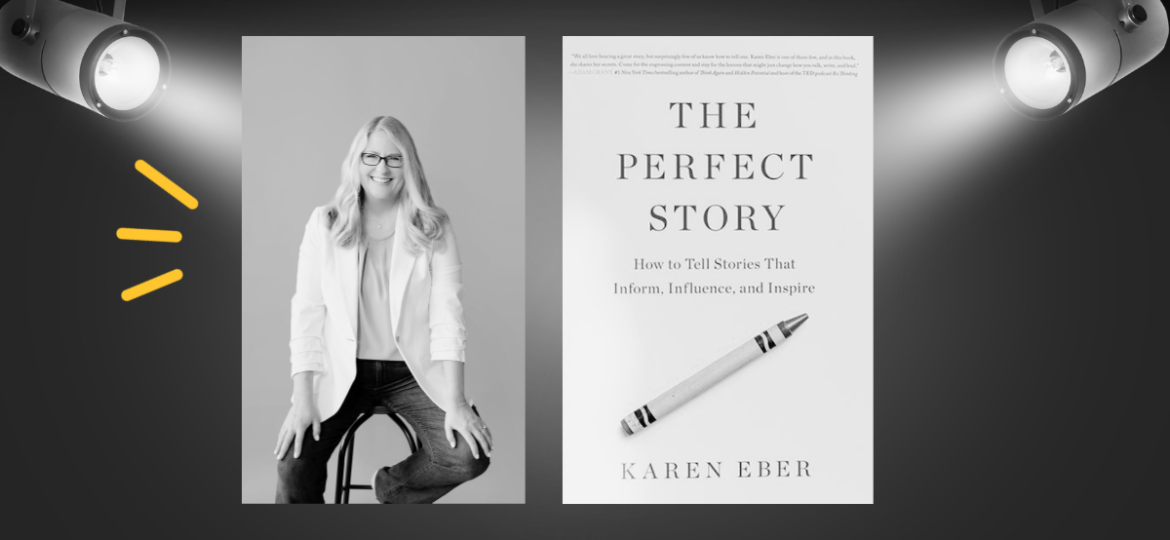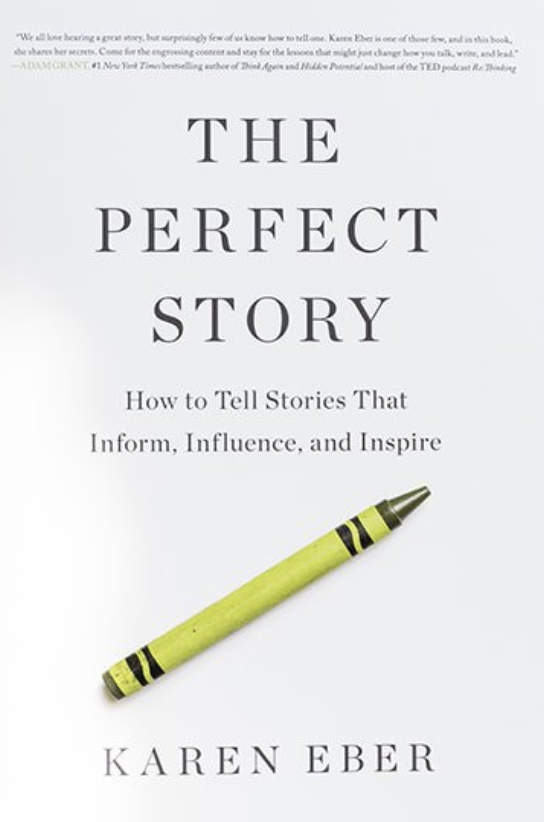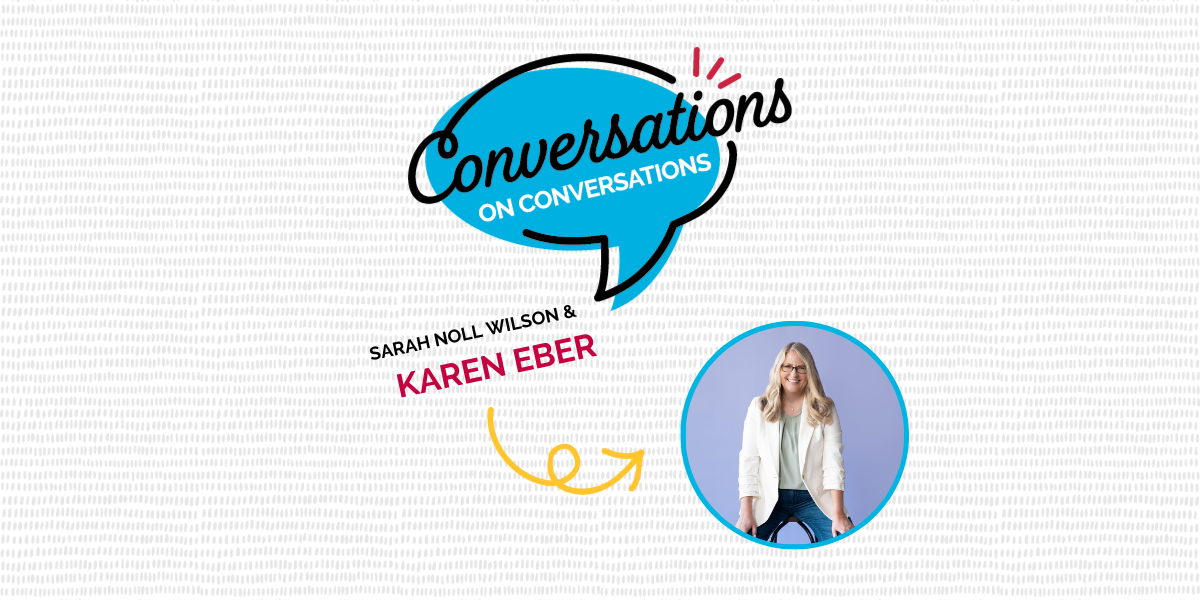
Welcome to another edition of Growth Central, where we get to hear from authors making a big impact with their message. This month, we’re celebrating and amplifying Karen Eber, author of The Perfect Story: How to Tell Stories that Inform, Influence, and Inspire.
Want a FREE copy of Karen’s stunning new book? Email us at hello@SarahNollWilson.com. We’ll randomly select ten people who reach out in the next week! Don’t forget to include your shipping address.

What’s the story behind the book? What has become clearer since? Here’s a Q&A with Karen, who answers those questions (and then some):
Q: Can you talk a little about your personal journey to The Perfect Story? Why did you write this book?
A: There are a lot of books out there on storytelling. Many touch on the science behind it, but not what to do with it. They also prescribe the four stories you need to tell. Our lives don’t fit neatly into four stories.
I wanted to share new research in a relatable way that challenges the idea that we are hardwired for stories. It is not enough to tell a story, the choices we make for what we include in the stories determine if they are engaging and memorable. The Perfect Story isn’t science class – but it does ground you in what is happening so you can make choices that engage the audience.
I’ve found that many people think they don’t have something interesting to share or they aren’t good storytellers. It’s almost as if there is a belief that storytelling genes are handed out and you either have them or don’t. I want to make storytelling accessible and show how anyone can find and tell the perfect story for any occasion.
Q: What did you find most challenging about bringing this book to life? What about most rewarding?
A: Writing the book was a joy. I am an introvert who does my best thinking through writing. It’s fun to reread things you wrote and think “Where did that come from?” I love editing because the real pieces emerge from it. But I quickly learned that I had to limit my editing sessions to about 90 minutes at a time. I started out editing all day and found it put me in a foul mood. When you’re editing, you’re looking for problems and it wasn’t helpful to sit in that mindset all day.
I also really loved recording the audiobook. It’s a bit like acting because you have to make choices in the moment on how you want to express something. Like most people, I hate the sound of my recorded voice. But put me in a professional recording studio with high end equipment and I loved it! Robert was my audiobook producer. He would quietly pop into my headphones asking me to repeat something again or offering encouragement. We all need a Robert in our ears cheering us on!
The hardest part of the book is publishing and marketing. There are 1047 steps to get a book into your hands. Some are obvious, many are hidden. There are so many asks you have to make, often repetitively. That gets draining. Books are sold one conversation at a time. Sometimes that conversation comes from me…sometimes it comes from champions of the book. You have to embrace that mindset.
Q: What became clearer to you in the process of writing this book (or what is clearer to you now having written it)?
A: I’ve been helping people be memorable communicators and storytellers for years. Writing the book helped me come up with different stories and examples that remove the block that many have toward storytelling.
Q: Who needs to read this?
A: I wrote The Perfect Story to help anyone become a better storyteller in business and life. There is even a section on how you share stories in a eulogy, toast, or job interview. Whether you are leading a team, giving a presentation, hosting a podcast, selling a product or service, interviewing for a job, or giving a toast at a wedding, The Perfect Story will help you take your stories and make them perfect.
The process and techniques I share apply to different functions, like Sales, Marketing, HR, and Engineering. They are also relevant across all industries, like pharma, tech, and financial services. The steps take you through how to find and tell your perfect story for any audience and occasion.
Q: If you had to distill it, what are the biggest things you hope readers take away from it (or hope they do/think more about moving forward)?
A: We’re not hardwired for stories. This implies every story we hear would be captivating. And we’ve all sat through enough bad stories to know that isn’t true. It’s not enough to tell a story. The way you tell a story makes a difference in the experience of it. There are specific considerations that will immerse the brain in the story and make it engaging.
Stories don’t start with ideas, they start with audiences. Each time we tell a story, there is an outcome we want people to experience. We start with the audience to get clear on those outcomes each time we tell a story.
Data doesn’t change our behavior, our emotions do. We decide through our experiences and emotions. If you want to help persuade an audience, you need to connect to the emotions of what you are talking about – including data. Stories cut through the noise and create that emotional connection.
Personal doesn’t mean private. Every story is personal…even if you are telling a story about someone else. There is a reason why you are the one telling it. You bring your perspective to it. But storytelling doesn’t require you to share things that you consider private.
The perfect story doesn’t exist. It’s not sitting on a shelf waiting for you to pick it up. Take the stories and experiences you have and make them perfect for each audience.
WANT MORE?
For more, listen to Karen and Sarah on the Conversations on Conversations podcast:
Episode 089: A Conversation on the Perfect Story with Karen Eber
Don’t Forget . . . Want a FREE copy of Karen’s stunning new book? Email us at hello@SarahNollWilson.com. We’ll randomly select ten people who reach out in the next week! Don’t forget to include your shipping address.
Sarah Noll Wilson is on a mission to help leaders build and rebuild teams. She aims to empower leaders to understand and honor the beautiful complexity of the humans they serve. Through her work as an Executive Coach, an in-demand Keynote Speaker, Researcher, Contributor to Harvard Business Review, and Bestselling Author of “Don’t Feed the Elephants”, Sarah helps leaders close the gap between what they intend to do and the actual impact they make. She hosts the podcast “Conversations on Conversations”, is certified in Co-Active Coaching and Conversational Intelligence, and is a frequent guest lecturer at universities. In addition to her work with organizations, Sarah is a passionate advocate for mental health.



